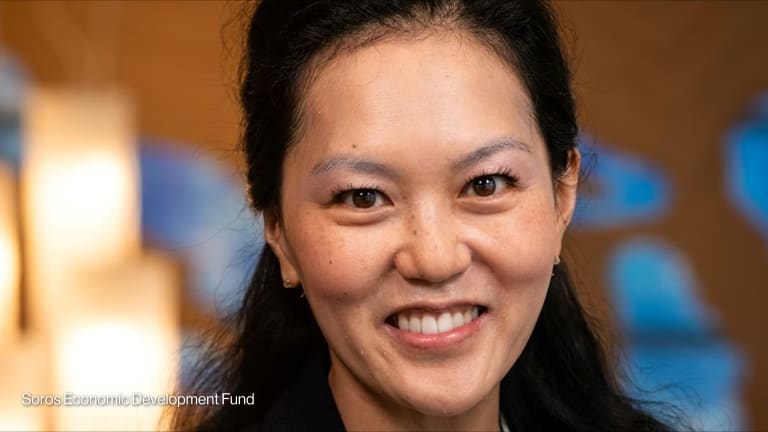
For Ambassador Mark Green, becoming president and CEO of the Seattle-based Initiative for Global Development means “coming full circle.”
“I worked as volunteer teacher [in Kenya], I served in government, I helped craft PEPFAR and the Millennium Challenge Corporation, and now I get to see these changes being put into action through private sector-driven development,” Green told Devex Impact.
As the new head of IGD, Green replaces Jennifer Potter, who led the independent nonprofit since its founding in 2003. In addition to having served as U.S. ambassador to Tanzania between 2007 and 2009, Green is known in the development community for his leadership roles at the U.S. Global Leadership Coalition and Malaria No More.
The IGD, a membership organization that brings together business leaders and investors with a commitment to Africa, has been active recently in articulating the business case for development, releasing a new tool for impact measurement and reporting on ways to catalyze investment in African agriculture.
Green spoke with Devex Impact about his vision for Africa’s development, the growing role for the private sector in development, and the technologies that he believes will transform the continent.
Why did you accept this new role at IGD?
What attracted me to IGD is its unusual history. The organization is 10 years old this spring, and if you look at its history from the earliest days, as the Seattle Initiative for Global Development started by “the three Bills” – Bill Gates Sr., Bill Ruckleshaus, and Bill Clapp – it has always tried to be in the forefront of development policy.
Early on that was about advocacy, building awareness, and awakening a constituency for American engagement among the business sector. Now that means we’re hoping to harness the strength of private enterprise and help channel it into catalytic investments that are producing poverty relief and providing opportunities for Africans to build communities and claim their bright future.
What are your priorities for the organization?
For me personally, the goal is to tell the IGD story and talk about some of the innovative tools we’re developing, so we can build the kind of network that produces real results and impacts.
For IGD itself, the priority is developing the tools and initiatives that maximize impact, but also building a network of what we call “frontier leaders,” high-capacity dedicated investors who are looking to make the kinds of investments that catalyze economic growth and result in poverty relief.
That is the core part of our work: developing that network and the tools to help that network realize its potential.
Will IGD continue to focus primarily on Africa?
We will certainly focus on Africa. I’m an Africanist by training, and I believe we’re in Africa’s time.
Africa is rising, and there’s an exciting generation of young leaders in Africa who are creating life-enhancing opportunities for their citizens. We want to be part of that, to provide assistance wherever we can.
Africa is also our focus because that’s where American businesses want to be. The rapid economic growth brings about real opportunities for American exports and for American partnerships that produce economic results back here at home.
Do you see the attitude of American business toward Africa changing?
I think people are awakening to the opportunities, but the challenges certainly remain. I was talking with two of our frontier leaders from Africa a few weeks ago, and I asked them what they thought the biggest barrier was to increased investment from America and Europe. And they said, “Misperceptions.”
What’s happened is that people’s perceptions of the challenges are artificially outweighing the modest risks. The risks are not as great as popular media would lead you to believe. Good news in Africa rarely gets reported. It’s not the media’s intention, it’s just that a plane landing safely isn’t news. If you tell an accurate story, then people will see there really are good opportunities. We want to help tell that accurate story.
Last year IGD published the “Business Case for Development,” which called on government donors to give business a more prominent seat at the table. Do you see donors moving in that direction?
I think that while everything is not perfect, there is a growing recognition that we as a nation need to do a better job involving business early in the process. President Obama’s Global Development Council met recently, and I was one of the outside experts brought in to talk about future of development. The fact that they are asking questions about how to work with private sector is an enormous step forward.
I do think there is a still a disconnect, however. For some people, partnering with the private sector means getting the private sector to do precisely what the government wants it to do, as opposed to looking for those areas – which are many — where the interests of the private sector and public sector align. That alignment is the sweet spot that will produce sustainable, measurable economic outcomes. I don’t think we’re there yet in terms of building our development policy around it, but I do think we are better off than we were.
Are you satisfied with the mechanisms available right now that enable partnerships for development between government and the private sector?
We can always do better, and we need to do better. In addition to bringing in the experienced voices in the business community early on in the planning process, we need to create a single access point for businesses that want to be involved in developing world. They usually are looking for ways to make a lasting difference in addition to producing financial returns.
When those businesses reach out to the government for knowledge or precise information regarding opportunities, they find a single access point, but it’s at every single agency, as opposed to a single, cross-cutting inter-agency access point.
I would argue that one way to make things more efficient is to better empower American embassies around the world, so that embassy strategic plans are public and measurable and that resources and tools follow those published plans so that you have a real synergy of interests. It would be quite a change, but I think people are ready for it.
IGD recently released a new tool for companies to measure socio-economic impacts. Why is impact measurement important from a business point of view?
Impact measurement matters for lots of reasons. First, it’s a way to measure internal operations and look at effectiveness and efficiencies. Secondly, it’s a way of examining the social and economic goods delivered through investments in places like Africa. In my experience, businesses and investors want to make a difference, and they believe they are making a positive difference by creating opportunity. This [tool] allows them to measure it and report on it. It’s a way of shining a bright light on positive development outcomes.
What innovations do you see that will be truly game-changing for development in the coming years?
The expanded use of the mobile phone platform is just stunning.
When I was a volunteer teacher in 1987 and 1988 in western Kenya, there was one wind-up telephone in the entire village. You literally had to wind it up and say, “Operator, give me Nairobi.” The call would come through a half-an-hour later. When I was in Tanzania a few years ago, my driver had three or four different SIM cards. It’s extraordinary how mobile phones have created access to meaningful communication.
On top of that, Africans, who are among the most innovative people I know, are finding through frugal innovation applications that are remarkable, from the distribution and analysis of malaria test results, to the mobile banking done through M-PESA, to the exciting mobile credit card transaction being done by Visa in Rwanda. So we go from a wind-up telephone to, 20 or 30 years later, [having] truly cutting-edge innovation that is unleashing the potential of a continent.
Explore related content
Join Devex, the largest online community for international development, to network with peers, discover talent and forge new partnerships – it’s free! Then sign up for the Devex Impact newsletter to receive cutting-edge news and analysis every month on the intersection of business and development.








